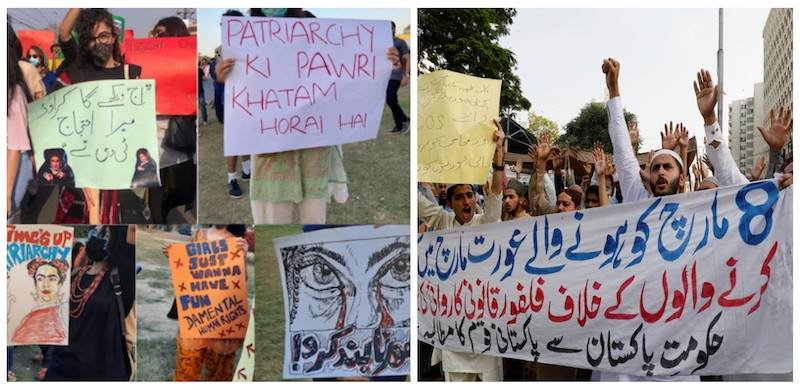
A sessions court on Thursday rejected a petition asking the court to order the police to register an FIR against organisers and over 200 unidentified participants of the Aurat March in Islamabad last month.
The petition was filed by a citizen named Khalid Mehmood who told the court that the Ravi Road police SHO said they won't lodge an FIR on his application. He accused the march participants of displaying 'objectionable' slogans at the event.
Additional District and Sessions Judge Hafiz Rizwan Aziz, in the decision, said that gender-based violence was a social issue that needs to be highlighted and the Aurat March was doing precisely that. He added that the participants of the Aurat March created no public disorder and the protest in fact took place with the permission of authorities.
Reprimanding the petitioner for levelling baseless allegations, the judge said that the petitioner's act of terming a vague slogan blasphemous reflected his own state of mind. The judge added that the petitioner made a serious accusation with no evidence to support it.
Further, the sessions judge said that it was alarming that the trend of levelling such grave allegations on the basis of subjective interference and interpretations is on the rise in society. "Subjective interferences cannot be forcibly imposed on speech of the citizens," he said.
The petition was filed by a citizen named Khalid Mehmood who told the court that the Ravi Road police SHO said they won't lodge an FIR on his application. He accused the march participants of displaying 'objectionable' slogans at the event.
Additional District and Sessions Judge Hafiz Rizwan Aziz, in the decision, said that gender-based violence was a social issue that needs to be highlighted and the Aurat March was doing precisely that. He added that the participants of the Aurat March created no public disorder and the protest in fact took place with the permission of authorities.
Reprimanding the petitioner for levelling baseless allegations, the judge said that the petitioner's act of terming a vague slogan blasphemous reflected his own state of mind. The judge added that the petitioner made a serious accusation with no evidence to support it.
Further, the sessions judge said that it was alarming that the trend of levelling such grave allegations on the basis of subjective interference and interpretations is on the rise in society. "Subjective interferences cannot be forcibly imposed on speech of the citizens," he said.
